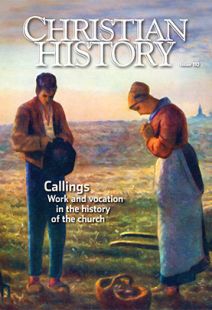Perpetua’s calling to Christ leads her to separate from her family
AFTER a few days there prevailed a report that we should be heard. And then my father came to me from the city, worn out with anxiety. He came up to me, that he might cast me down, saying, “Have pity my daughter, on my gray hairs. Have pity on your father, if I am worthy to be called a father by you. If with these hands I have brought you up to this flower of your age, if I have preferred you to all your brothers, do not deliver me up to the scorn of men. Have regard to your brothers, have regard to your mother and your aunt, have regard to your son, who will not be able to live after you. Lay aside your courage, and do not bring us all to destruction; for none of us will speak in freedom if you should suffer anything.”
These things said my father in his affection, kissing my hands and throwing himself at my feet; and with tears he called me not Daughter, but Lady. And I grieved over the gray hairs of my father, that he alone of all my family would not rejoice over my passion. And I comforted him, saying, “On that scaffold whatever God wills shall happen. For know that we are not placed in our own power, but in that of God.” And he departed from me in sorrow.
The Martyrdom of Saints Perpetua and Felicitas, third century.
By Perpetua
[Christian History originally published this article in Christian History Issue #110 in 2014]
Perpetua was a second-century female writer and martyr.Next articles
An early church list of unacceptable jobs for Christians
Charioteers, prostitutes and military governors all had to quit
The Apostolic TraditionDuty and delight
Medieval Christians lived in a tension between action and contemplation, between this world and the next
Edwin Woodruff TaitSupport us
Christian History Institute (CHI) is a non-profit Pennsylvania corporation founded in 1982. Your donations support the continuation of this ministry
Donate



